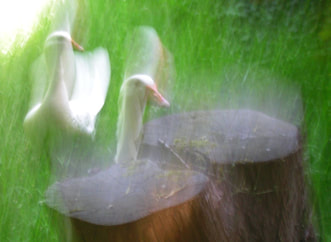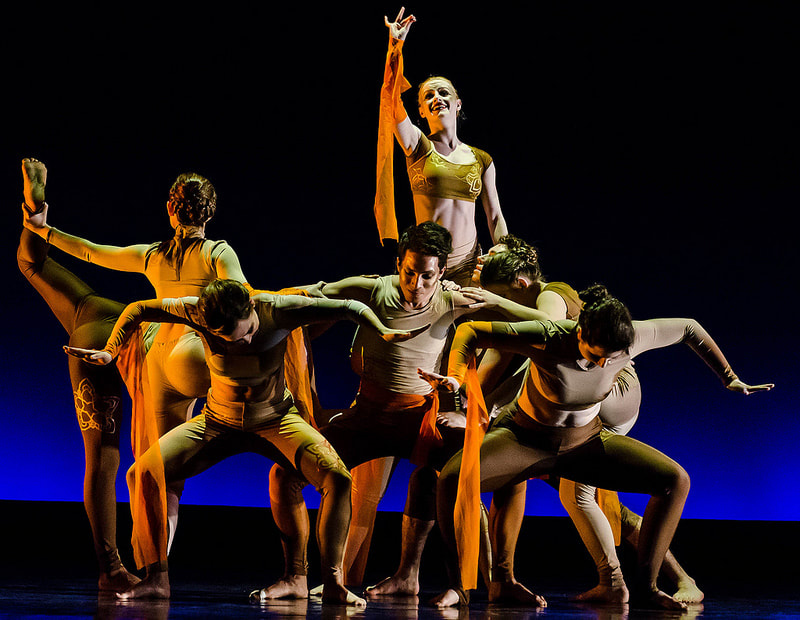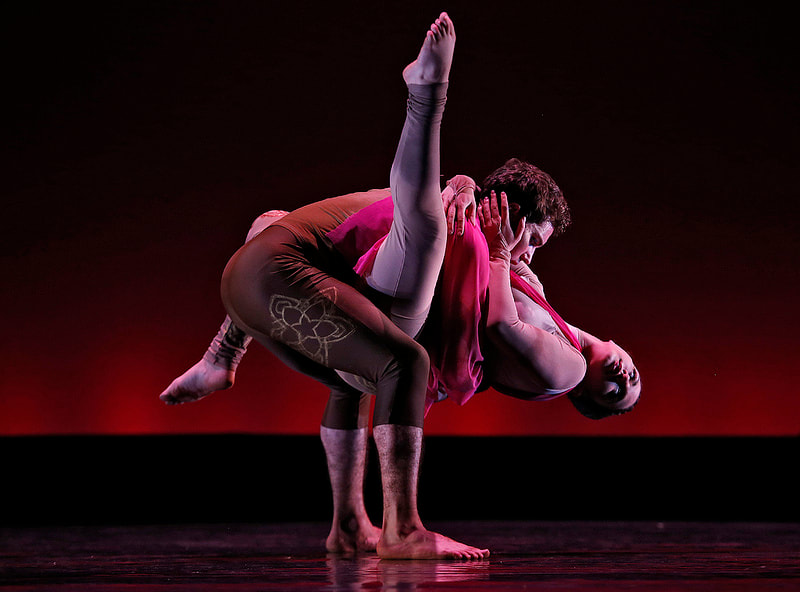Florence + the Machine's "Big God"

Ghosting is "the phenomenon of leaving a relationship of some kind by abruptly ending all contact with the other person, and especially electronic contact, like texts, emails, and chats." The person who is left behind is ghosted. The person who is ghosted experiences what Florence Welch of Florence + the Machine calls a "desire within the void."
Dancing from Desire, with Rage and Wonder
What to do when the desire hits you? The "Big God" by Florence = the Machine offers a response. If you have been ghosted, so the video seems to say. you need not hide from the pain, but you can also dance the pain, in a spirit of rage and wonder. The dance becomes a celebration, albeit mixed with anger and frustration. In the dancing you are of course missing the one who ghosted you. And yet at the same time you realize that that person could not have satisfied your deepest yearning. There is a cavernous hole within you that cannot filled the a text message, or perhaps even a person. You find yourself needing a Big God. Indeed raging for the Big God. Rumi would understand this rage when he lost Shams. You rage for the person who has disappeared, but in their disappearance you long for something more.
*
Florence Welch isn't quite sure what to make of the rage. In an interview she says that you are raging against yourself, perhaps for needing the person, or for having such a cavernous hole. But the Sufis us might also wonder if you aren't raging for the Big God: that is, for a divine Beloved who can fill the hole. And perhaps the Big God is found, not as an outcome of the rage, but within the rage itself. As the Sufis make clear, we experience God most intimately, most deeply, when the Beloved is absent and we long for her, him, or them.
The Bigness of the Big God
Still the question remains, is there really a Big God. Process theology proposes that there truly is a Big God who can fill the hole, but that the bigness of this god is not that of an almighty being who could, in principle, exercise unilateral power and make everything alright. The "bigness" of the Big God is different from the bigness of, say, a king on a throne. Instead it is the bigness of a universal and spacious heart -- a cosmic compassion -- who shares in the joys and suffering of all, who is within each person as a lure toward the fullness of life in mutuality with others, and whose very life is made complete by the world.
Yes, the Big God may fill our hearts with a sense of being loved unconditionally, such that we move beyond the anguish of being ghosted. But we also fill the heart of the Big God with our passions, our feelings, our yearnings for intimacy, our love of life. And we do so, not by entering into an ethereal realm beyond the flesh, but by dancing in the flesh. As Mayra Rivera makes clear in her theology of the flesh, our physical feelings help make the Big God big. Sometimes we may not be able to think our way out of our desire within the void, but we can dance in and from the void itself, and feel a sense of the bigness of the big God.
Always we will dance from the waters of chaos. As the video suggests, there's a watery dimension from which all yearning comes: a primal depth. In The Face of the Deep: A Theology of Becoming another theologian, Catherine Keller, speaks of these depths the Deep, upon whose face even God dances. In commenting on her perspective Rabbi Bradley Artson points out just how biblical this is:
What the Torah actually says is, “When God began creating heaven and earth, there was tohu va-vohu (chaos), and the ruach (wind/breath/spirit) of God was vibrating over the face of tehom, the deep, and God said, ‘Let there be light,’ and there was light.” According to the Torah, was there tohu va-vohu, chaos, before God started creating? Yes. Unambiguously yes. At the instant God began creating, tohu va-vohu was already existent, and the ruach of God flutters over tehom (that had to be there already for the spirit of God to be able to flutter over it). The simple meaning of Genesis 1 is that there is pre-existent darkness and chaos. The tehom, the chaos, already exists — bubbly, uncontainable and undomesticated. God’s creative act is not the special effect of something from nothing, but the steady chesed (lovingkindness) of converting chaos into cosmos. Tohu va-vohu and the tehom have always existed, and threaten still. God has always been, and is still, inviting/commanding the chaos into cosmos. We have misunderstood the nature of Divine creativity and power. (God Almighty? No Way!)
Truth be told, the Big God creates itself out of the Deep and we create ourselves out of it too. The philosopher Whitehead speaks of the Deep as the creativity from which all things emerge in their self-creative inter-becoming: creaturely and divine. Splash on.
Dancing from Desire, with Rage and Wonder
What to do when the desire hits you? The "Big God" by Florence = the Machine offers a response. If you have been ghosted, so the video seems to say. you need not hide from the pain, but you can also dance the pain, in a spirit of rage and wonder. The dance becomes a celebration, albeit mixed with anger and frustration. In the dancing you are of course missing the one who ghosted you. And yet at the same time you realize that that person could not have satisfied your deepest yearning. There is a cavernous hole within you that cannot filled the a text message, or perhaps even a person. You find yourself needing a Big God. Indeed raging for the Big God. Rumi would understand this rage when he lost Shams. You rage for the person who has disappeared, but in their disappearance you long for something more.
*
Florence Welch isn't quite sure what to make of the rage. In an interview she says that you are raging against yourself, perhaps for needing the person, or for having such a cavernous hole. But the Sufis us might also wonder if you aren't raging for the Big God: that is, for a divine Beloved who can fill the hole. And perhaps the Big God is found, not as an outcome of the rage, but within the rage itself. As the Sufis make clear, we experience God most intimately, most deeply, when the Beloved is absent and we long for her, him, or them.
The Bigness of the Big God
Still the question remains, is there really a Big God. Process theology proposes that there truly is a Big God who can fill the hole, but that the bigness of this god is not that of an almighty being who could, in principle, exercise unilateral power and make everything alright. The "bigness" of the Big God is different from the bigness of, say, a king on a throne. Instead it is the bigness of a universal and spacious heart -- a cosmic compassion -- who shares in the joys and suffering of all, who is within each person as a lure toward the fullness of life in mutuality with others, and whose very life is made complete by the world.
Yes, the Big God may fill our hearts with a sense of being loved unconditionally, such that we move beyond the anguish of being ghosted. But we also fill the heart of the Big God with our passions, our feelings, our yearnings for intimacy, our love of life. And we do so, not by entering into an ethereal realm beyond the flesh, but by dancing in the flesh. As Mayra Rivera makes clear in her theology of the flesh, our physical feelings help make the Big God big. Sometimes we may not be able to think our way out of our desire within the void, but we can dance in and from the void itself, and feel a sense of the bigness of the big God.
Always we will dance from the waters of chaos. As the video suggests, there's a watery dimension from which all yearning comes: a primal depth. In The Face of the Deep: A Theology of Becoming another theologian, Catherine Keller, speaks of these depths the Deep, upon whose face even God dances. In commenting on her perspective Rabbi Bradley Artson points out just how biblical this is:
What the Torah actually says is, “When God began creating heaven and earth, there was tohu va-vohu (chaos), and the ruach (wind/breath/spirit) of God was vibrating over the face of tehom, the deep, and God said, ‘Let there be light,’ and there was light.” According to the Torah, was there tohu va-vohu, chaos, before God started creating? Yes. Unambiguously yes. At the instant God began creating, tohu va-vohu was already existent, and the ruach of God flutters over tehom (that had to be there already for the spirit of God to be able to flutter over it). The simple meaning of Genesis 1 is that there is pre-existent darkness and chaos. The tehom, the chaos, already exists — bubbly, uncontainable and undomesticated. God’s creative act is not the special effect of something from nothing, but the steady chesed (lovingkindness) of converting chaos into cosmos. Tohu va-vohu and the tehom have always existed, and threaten still. God has always been, and is still, inviting/commanding the chaos into cosmos. We have misunderstood the nature of Divine creativity and power. (God Almighty? No Way!)
Truth be told, the Big God creates itself out of the Deep and we create ourselves out of it too. The philosopher Whitehead speaks of the Deep as the creativity from which all things emerge in their self-creative inter-becoming: creaturely and divine. Splash on.
Lyrics to Big GodYou need a big god
Big enough to hold your love You need a big god Big enough to fill you up You keep me up at night To my messages, you do not reply You know I still like you the most The best of the best and the worst of the worst Well, you can never know The places that I go I still like you the most You'll always be my favorite ghost You need a big god Big enough to hold your love You need a big god Big enough to fill you up Sometimes I think it's gettin' better And then it gets much worse Is it just part of the process? Well, Jesus Christ, it hurts Though I know I should know better Well, I can make this work Is it just part of the process? Well, Jesus Christ, Jesus Christ, it hurts Jesus Christ, Jesus Christ, it hurts You need a big god Big enough to hold your love You need a big god Big enough to fill you up Shower your affection, let it rain on me And pull down the mountain, drag your cities to the sea, yeah Shower your affection, let it rain on me Don't leave me on this white cliff Let it slide down to the, slide down to the sea Slide down to the, slide down to the sea |
About the Video
Autumn de Wilde (Death Cab for Cutie, Spoon, Rilo Kiley) directed the clip, which focuses on Welch and a group of dancers as they splash and stomp through a light pool of water against a midnight-black background. At one point, everyone but Welch levitates above ground; the singer ends the piece on her own, writhing around as the camera zooms closer. |



